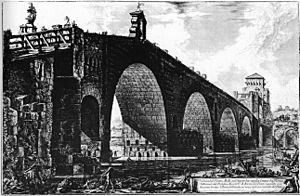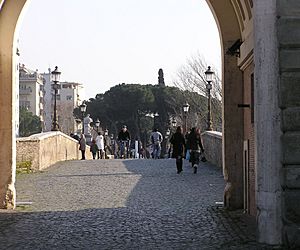Ponte Milvio facts for kids
Quick facts for kids Ponte MilvioPons Milvius (Latin) |
|
|---|---|

Ponte Milvio over the Tiber
|
|
| Coordinates | 41°56′08″N 12°28′01″E / 41.93556°N 12.46694°E |
| Crosses | Tiber |
| Locale | Rome, Italy |
| Other name(s) | Milvian Bridge, Mulvian Bridge Pons Mulvius Ponte Molle |
| Characteristics | |
| Design | Arch bridge |
| Material | Stone, brick |
| Total length | 136 m |
| Width | 8.75 m |
| Longest span | 18.55 m |
| Number of spans | 6 |
| History | |
| Construction end | 109 BC (stone bridge) |
The Milvian Bridge (also called Ponte Milvio or Ponte Molle in Italian) is an old and famous bridge in Rome, Italy. It crosses the Tiber River in the northern part of the city. This bridge was very important for travel and trade during the time of the Roman Empire. It was also the place of a major historical event: the Battle of the Milvian Bridge in 312 AD, which helped Constantine become a powerful Roman emperor.
Contents
Building the Milvian Bridge
The first bridge in this spot was built around 206 BC. A Roman leader named Gaius Claudius Nero had it built after a big battle against the Carthaginians.
About a hundred years later, in 109 BC, a new stone bridge was built. A Roman official called a censor, Marcus Aemilius Scaurus, oversaw its construction. He had the old wooden bridge taken down to make way for the stronger stone one.
Important moments in history
The Milvian Bridge has seen many important events over the centuries.
Roman times
- 63 BC: Letters from a group planning to overthrow the government, led by Catiline, were stopped here. This allowed Cicero, a famous Roman speaker, to show the letters to the Roman Senate and stop the plot.
- 312 AD: One of the most famous battles in Roman history happened near this bridge. Constantine I fought against his rival Maxentius. Constantine won, becoming the sole ruler of the Western Roman Empire. This battle was a turning point for Christianity in the Roman Empire.
Middle Ages and beyond
- During the Middle Ages, a monk named Acuzio helped fix up the bridge.
- In 1429, the bridge was falling apart. Pope Martin V asked a well-known architect, Francesco da Genazzano, to repair it.
- Later, in the 18th and 19th centuries, two more architects, Giuseppe Valadier and Domenico Pigiani, made changes to the bridge.
- In 1849, the bridge was badly damaged by troops led by Giuseppe Garibaldi. They tried to stop a French army from invading. The bridge was fixed again in 1850 by Pius IX, who was the Pope at that time.
Love locks on the bridge
In the early 2000s, a new tradition started at the Milvian Bridge. After a popular Italian book and movie called "I Want You" came out in 2006, couples began attaching padlocks to a lamppost on the bridge. They would then throw the key into the Tiber River as a sign of their lasting love.
However, the lamppost could not hold all the weight. In 2007, it partly collapsed. People then started putting locks on other parts of the bridge, like railings and even trash cans. The city of Rome tried to stop this by giving out fines of €50 (about $55) to anyone caught attaching locks. In 2012, city workers removed all the locks from the bridge. Even though the locks are gone from the Milvian Bridge, this tradition has spread to many other bridges around the world.
See also
 In Spanish: Puente Milvio para niños
In Spanish: Puente Milvio para niños
- Ponte Sant'Angelo
- List of Roman bridges
- Roman architecture
- Roman engineering




